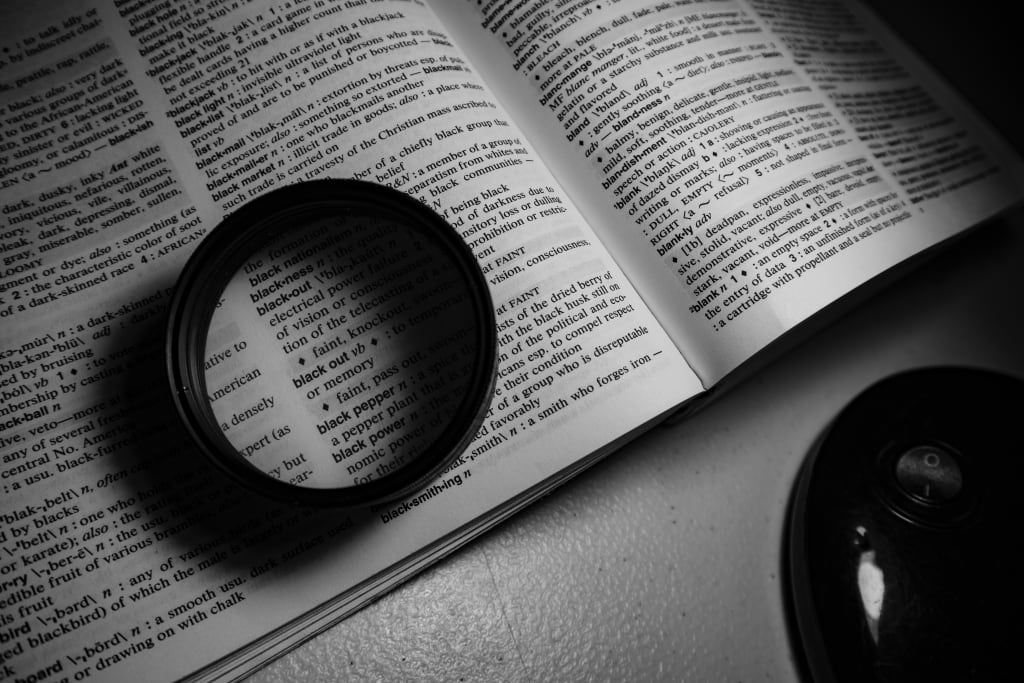15 Unusual Words to Add to Your Vocabulary
Unique Words You Never Knew You Needed

As a writer, I truly love words - written language is a flowing, living thing that never ceases to amaze me. When I was a child I would read the dictionary in stages, picking out words to pester my grandparents with. They were wonderfully patient, of course, but it must have become tiring. From writing my first book at 8 (it was about a vampire flea, and honestly I may re-write it as a childrens' book yet) to the present day, I've found great joy in discovering a new word - it's like meeting an old friend for the first time.
These are some of the best and most unusual words that I've come across in my literary explorations:
1. Defenestration
A funny and changeable little word, Defenestration is my go-to icebreaker word for parties now. In the most literal, and humorous, sense it means "the act of throwing someone out of a window". I think it's just amazing that there's a word for this. In an informal sense, however, it is generally used to mean the process or act of demoting or dismissing someone from a position of authority or acclaim. For example "the general was subjected to defenestration after his failure in the war".
2. Insouciant
One of those words that somehow feels like its meaning, Insouciant describes a person who is "nonchalant (another good word), calm, and casual - free from concern, worry, or anxiety".
3. Brouhaha
Brouhaha "a state of commotion or excitement, a noisy reaction or response: hubbub, uproar" - the meaning of this word is nowhere near as fun as saying the word. Unfortunately, Brouhaha has become attached to the stuff-upper-lips and plummy accents crowd - I want to take it back.
4. Sonder
A personal favourite of mine, Sonder is one of the most beautiful words in the world... or at least I think so. Defined as "the realization that each person and passerby has a life as real, vivid, and complex as ones' own", it's one of those words that describes a sensation or emotion that is intangible.
5. Festooned
A fun word to say, Festooned also has a lovely meaning. To festoon something means to decorate, to adorn, to drape it with decorative and beautiful things. The most common definition is "to adorn a place with chains or garlands of flowers".
6. Murmuration
A beautiful word to say and hear, Murmuration is attached to an equally stunning and unusual occurence. In fact, it refers only to the stunning formations that result from hundreds or thousands of Starlings fly in intricate, pulsing movements as a flock. I've seen a murmuration in action - it makes you believe you're in Gods own country.
7. Hiraeth
A pretty word, a Welsh word, in fact, Hiraeth is one of those words that encapsulate a feeling or emotion. It went viral on TikTok (unfortunately for the girl who made the original video because she was quickly and repeatedly told that she had butchered the pronunciation by well over a hundred thousand people). Meaning "a deep longing, yearning or wistfulness for something, especially one's homeland".
8. Rigmarole
An old word, often heard in working-class Scottish homes as mothers and grandmothers bemoan the issues their children and grandchildren cause, Rigmarole is actually an altered, Kentish colloquial variation of 'ragman roll'. This was a long list or a roster, of course, and so while Rigmarole formally means "any long, foolish, confusing speech or discourse", in practice it generally means a situation or undertaken in an unnecessarily complex way. For example, my granny would say, "sit down and eat your dinner, I'm sick of this rigmarole" if we were making the process of dinner difficult for her.
9. Scuttlebutt
Like many words, Scuttlebutt has evolved drastically over time. In the golden age of wooden sail ships, a scuttlebutt was a cask used to hold the days' supply of drinking water. It was then used to describe a drinking fountain in a non-nautical sense. However, these days scuttlebutt is an informal, still primarily naval, term for rumour or gossip (particularly in the USA).
10. Wuthering
Most people only think of this word in conjunction with the novel Wuthering Heights, but it is actually a word in its own right. In fact, when you consider its meaning, the title of the book makes far more sense. A word of the Yorkshire dialect, Wuthering is a descriptive term that was applied to weather, or wind in particular. A wuthering wind was one which was "blowing strongly or violently with a roaring sound" - the word is related to the now obsolete "whither" and ultimately originates from an old Norse word "hvitha" which can be defined as a "mighty squall of wind".
11. Sesquipedalian
Have you ever met someone who uses long words for the sake of it, making their sentences complex and damn-near indecipherable? If so, you've met someone who has a Sesquipedalian manner of speaking. Someone who does this while using the words incorrectly can be said to be falling afoul of "catachresis".
12. Juggernaut
One of my top 5 favourite words for personal and vainglorious reasons, Juggernaut means "a huge, powerful, and overwhelming force" but is also used to describe large, heavy, articulated vehicles in Britain. A martial arts instructor once told me, when I was around 14, that I was "small for a juggernaut" - I know now that what he meant was that my bloody-minded determination outweighed my physical capabilities, but I still love that word. It feels like it's mine.
13. Finagle
Finagle is a wonderfully fun word that can be traced to an old English dialect which was once widely used along the Welsh marches and across the West Country. Meaning "to obtain something in a devious or dishonest manner", it's mostly used in a minor sense. A child might finagle an extra sweetie while their parent might finagle some time away from work by drawing out a doctors appointment a little.
14. Lachesism
A sneaky little word that describes a feeling most people won't admit to having, Lachesism is the state of "desiring to be struck by disaster and survive; to lose all of one's belongings in a fire, to go through a cataclysmic event for the unique and terrible pleasure of doom". In short, it's the desire to come close to the end in order to renew appreciation for life.
15. Occhiolism
If you've ever found yourself suddenly aware of the small and limited nature of your perspective and experiences, then you have experienced Occhiolism. A touch of occhiolism is good for the soul and mind, I think - it keeps us grounded and humble.
About the Creator
S. A. Crawford
Writer, reader, life-long student - being brave and finally taking the plunge by publishing some articles and fiction pieces.






Comments
There are no comments for this story
Be the first to respond and start the conversation.